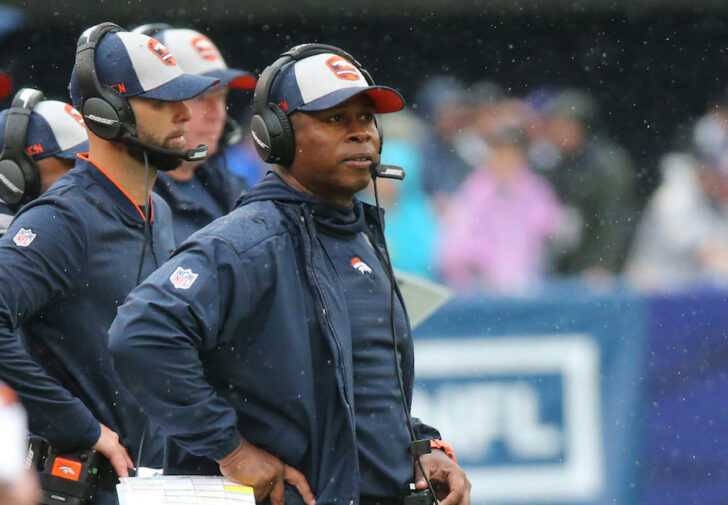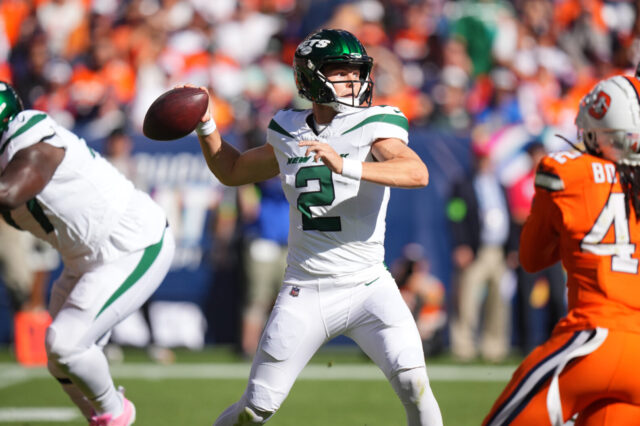The officiating was poor.
Then again, it’s the NFL, and it typically is. And it goes both ways, too.
But the Broncos’ play on field in Baltimore on Sunday was poorer. They had their chances.
Case Keenum? Not his best day. The quarterback who’s engineered a pair of fourth-quarter comebacks already this season couldn’t find a groove against the Ravens – not ever. He was 22-of-34 for 192 yards and a pick.
His receivers didn’t help much, again having enough significant drops to matter.
The running game was mediocre, too. On the day, Denver ran for 120 (net) yards, but 35 of those came off of a 35-yard sprint by Emmanuel Sanders, the third-longest rushing touchdown by a wide receiver in Broncos history. Phillip Lindsay was good early – going 20 yards on four carries – but he was questionably ejected (with 2:31 remaining in the first half) while fighting for a fumble in the pile.
It was easily the worst game Denver’s offensive line – which had been decent up until Sunday – has played all season, as well. In addition to the endless holding penalties (we’ll get to that shortly), Keenum was running for his life for much of the day. He was sacked twice, but pressured all day.
Denver’s defensive secondary is subpar (and now dinged up).
Simply put, the Broncos didn’t look like much a football team, and the 14-27 score reflected that.
But at the end of the day, individual performances aside, there is a dark cloud hovering over the Broncos: They’re an extremely undisciplined team.
Back to those penalties. Against the Ravens, the Broncos were penalized 13 times for 120 yards; that’s a number tough to overcome for any team. On the season, Denver has been penalized 26 times for 215 yards – or, almost 71 yards per game. Following Week 3’s slate of games, the Broncos are the fifth-most penalized team in the NFL.
But that doesn’t tell the entire story. The penalties aren’t always of the holding variety. Against the Ravens, with 3:40 to play in the game, the Denver offense was flagged for Too Many Men on the Field. It might have been the penalty that decided the game, as 4th-and-1 quickly turned into 4th-and-6.
With the game on the line, and the clock ticking down, a holding penalty that saves a quarterback sack is one thing. Too Many Men on the Field? That’s another. That’s a sign the Broncos don’t have their act together. Through three games, the Broncos have committed at least eight penalties that could be chalked up to poor discipline or lack of organization: Four unnecessary roughness penalties, a false start, a delay of game and two flags for Too Many Men on the Field.
Early in the second half against the Ravens, the Broncos were forced to use a timeout because they only had 10 men on the field. That’s not a penalty, but losing a valuable timeout might as well be.
Speaking off that time out, that’s another area in which the Broncos appear to be undisciplined. While difficult to illustrate statistically, any general observer of the Broncos might conclude that Vance Joseph is not particularly good with regard to his management of time and timeouts. In Week 1 against the Seahawks, he took three timeouts into the halftime locker room. Against the Raiders, Joseph’s use of timeouts was again questionable.
On Sunday against the Ravens, an irresponsible challenge flag in the first half stole a timeout that could have been useful. Joseph’s decision to challenge an 8-yard reception (that was an extremely obvious legal catch, by the way), was perhaps one of the worst challenges in recent memory. Not only was it overturned, but the play, with 10:32 remaining in the first half, was fairly insignificant – it didn’t even result in a first down.
To put it bluntly, Joseph appears to have no clue with regard to both challenge flags and timeouts. And it’s hurting his team’s chance(s) to win.
But it’s not just that – it’s clock management in general.
In need of 13 points, the Broncos found themselves knocking on the door against the Ravens. With the ball on the Baltimore 13-yard line, 1st-and-10, 4:24 remaining on the clock and two timeouts remaining, a comeback was certainly mathematically feasible. But then Joseph’s time management deficiencies surfaced.
Following a completed pass in the middle of the field that left the Broncos at 2nd-and-1, two middle runs were called. Neither gained a yard, and neither got out of bounds. The only thing that stopped the clock was the penalty for Too Many Men on the Field. The fourth down play was unsuccessful, but, hypothetically, had it worked, the Broncos would have burned no less than two full minutes on four plays inside the 15. That kind of time management is unacceptable.
The 2-0 start in Denver has suddenly been overshadowed by a sloppy, sloppy loss in Baltimore. A Week 4 match up against Kansas City – a team that’s passed all over anyone its faced thus far – likely spells a 2-2 record a week from today. The only way Denver has a shot in that game is to play nearly perfectly – and that includes discipline and time management.
How you bettin’?
It’s been said that Denver’s 2-0 start saved Joseph’s job – at least for a while. But who are we kidding? The Broncos have two wins despite their lack of discipline and time management. They’ve got one loss because of those two things.
After the Chiefs come to Denver and win, it won’t be long before the gripes that defined last season will resurface. The Broncos don’t have discipline. The Broncos are poorly coached.
Here we go again.



